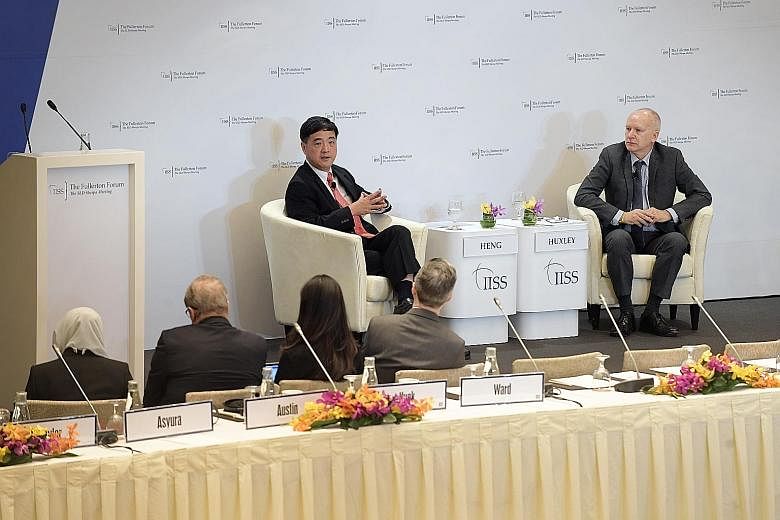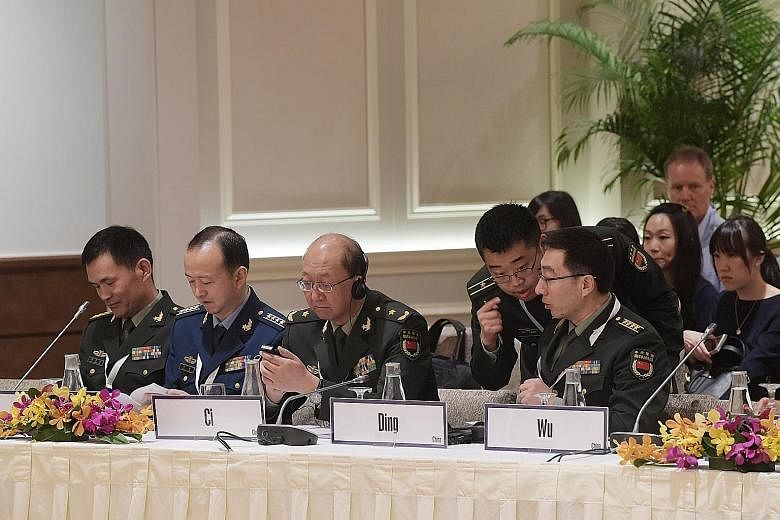While multilateralism remains relevant today, it can no longer be taken for granted, with an increasing tendency from some to push back against it, said Senior Minister of State for Defence Heng Chee How yesterday.
There is a renewed sense among some major powers that their interests would be better met through unilateral or bilateral means, while the unequal outcomes of trade liberalisation have led many to perceive free trade as unjust, he said.
To take multilateralism forward, the rules and structures of multilateral institutions should be updated. Leaders could better communicate the benefits and outcomes of multilateral meetings, to secure mass support for it, he added.
Mr Heng was giving the keynote address at the 8th IISS Fullerton Forum: The Shangri-La Dialogue Sherpa Meeting at The Fullerton Hotel, organised by the International Institute for Strategic Studies (IISS).
In the audience were about 100 delegates from more than 25 countries, including senior defence officials and high-ranking military officers.
The annual event, held from Sunday to today, is meant to be a platform for sharing views ahead of the annual Shangri-La Dialogue in June.
Mr Heng said that at its most basic level, multilateralism is a principle in international relations where three or more countries come together to pursue a common goal.
Since 1945, the world has seen an unprecedented surge of multilateral institutions and systems, such as the United Nations, the Organisation for Economic Cooperation and Development, and the Non-Aligned Movement, he said.
While multilateralism has been a key feature of the international system, there is an increasing tendency to push back against this idea and practice, said Mr Heng.
On the security front, there is a renewed sense, notably among major powers, that multilateral arrangements constrain, rather than enhance, their influence, he added.
At the same time, the unequal outcomes of trade liberalisation, often a product of multilateral economic cooperation, have led many to perceive global free trade as unjust, he said.
"These cumulative pushbacks against multilateralism weaken our collective resolve and ability to tackle global challenges together," added Mr Heng.
"Worse, it could feed a spiral of mutual distrust and zero-sum competition, as well as exacerbate tensions among countries."
Among the benefits multilateralism has brought is economic prosperity, with many regional countries benefiting with the progressive liberalisation of trade, said Mr Heng.
Multilateralism is also key to banding countries together to counter threats, such as piracy, terrorism and natural disasters, which hold no regard for national boundaries, he said.
On the way ahead, Mr Heng suggested multilateral institutions can be strengthened, including updating and renewing the rules and structures of multilateral institutions.
He added that multilateralism could be made more accessible to the layman by explaining how leaders arrive at decisions and reach consensus.
In a question-and-answer session after his speech, an audience member asked Mr Heng about the role that Asean could play in upholding the multilateral order.
Responding, Mr Heng said one area of focus was pushing for cooperation within Asean.
"Because whatever you might lecture others on, the most important thing is to be a good example yourself. That gives you the greatest credibility," he said.



